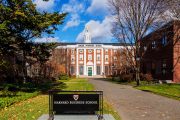
He once supported, he says, all the Covid-19 mitigation efforts, from lockdowns to “vaccines” to boosters. He truly believed authorities had our best interests at heart when instituting their pandemic restrictions. But, says seventh-year medical (M.D./Ph.D.) student and researcher Kevin Bass:
“I was wrong.”
“We in the scientific community were wrong,” he continued. “And it cost lives.”
Writing at Newsweek Monday, Bass doesn’t just want the record corrected; rather, he calls on the scientific establishment to issue a complete mea culpa. This is a necessary first step, he insists, toward repairing an image that medical professionals themselves tarnished via massive, collective malpractice.
In his indictment, Bass writes:
I can see now that the scientific community from the CDC to the WHO to the FDA and their representatives, repeatedly overstated the evidence and misled the public about its own views and policies, including on natural vs. artificial immunity, school closures and disease transmission, aerosol spread, mask mandates, and vaccine effectiveness and safety, especially among the young. All of these were scientific mistakes at the time, not in hindsight. Amazingly, some of these obfuscations continue to the present day.
But perhaps more important than any individual error was how inherently flawed the overall approach of the scientific community was, and continues to be.
…We excluded important parts of the population from policy development and castigated critics, which meant that we deployed a monolithic response across an exceptionally diverse nation, forged a society more fractured than ever, and exacerbated longstanding heath and economic disparities.
He further states that we “created policy based on our preferences, then justified it using data. And then we portrayed those opposing our efforts as misguided, ignorant, selfish, and evil.”
“We made science a team sport, and in so doing, we made it no longer science,” he continued — and inspired resistance. While true, the team-sport phenomenon ever threatens. In fact, apropos here is to say of scientists (and many professions) what Thomas Jefferson did of judges:
Scientists “are as honest as other men, and not more so. They have, with others, the same passions for party, for power, and the privilege of their corps.”
Thus must scientists be accorded dignity — but not deification.
Bass made a particularly important point when criticizing his and his fellows’ “emotional response and ingrained partisanship,” which “prevented us from seeing the full impact of our actions on the people we are supposed to serve.” This led to the further impoverishment of the poor and damage to the middle class and others, all while connected pseudo-elites and corporate interests got richer.
Misguided and misplaced “emotional” responses are, in fact, a bane of man, and people make feelings-based decisions all too often. Professor Thomas Sowell observed, “It doesn’t matter how smart you are if you don’t think,” and we don’t truly think, thoroughly, when emotion clouds our reason. People often fail at distinguishing well between which ideas (notions?) are the result of intellectual analysis and which ones result from emotion, too. I’ve called the extent to which we avoid having emotion cloud our judgment “functional intelligence.”
Bass also laments that those espousing alternative Covid views were censored and demonized, “often not on the basis of fact but solely on the basis of differences in scientific opinion,” he writes. This included dismissing President Trump even when he was a voice of reason, and deifying the often-wrong, perennially flip-flopping Anthony Fauci.
The scorn they heaped on dissenters eroded public trust, Bass additionally points out, and excluded many important voices “from what should have been a national, collaborative project.”
Consider the hypocrisy, too. We heard in early 2020 that SARS-CoV-2 was a “novel virus” we knew little about, but also:
Non-establishment opinions and debate on this thing we’re ignorant of will not be tolerated!
So the medical community authored its own credibility loss, Bass states. Marginalization of dissenters by pseudo-elites sparked the rise of conspiracy theories and alternative therapies, which, valid or not, were reflexively labeled “misinformation” and “scientific illiteracy”; this led to even legitimate concerns and points being suppressed by a true conspiracy — between Big Brother and Big Tech.
This happened despite Covid policy having been forged by a small pseudo-elite fringe in “academia, government, medicine, journalism, tech, and public health,” writes Bass, individuals “highly educated and privileged.” He’s only half right about the latter, though: These people are schooled. Yet as the apocryphal saying admonishes, “Never let your schooling interfere with your education.”
In summary, “If our public health officials had led with less hubris,” Bass concludes, “the course of the pandemic in the United States might have had a very different outcome, with far fewer lost lives.”
For sure. As renowned internist, cardiologist, and Covid expert Dr. Peter McCullough pointed out long ago, had a proper official treatment protocol (e.g., an ivermectin-based one) been established early on, 85 percent of those dying of the China virus could have been saved.
One more point: A significant issue Bass mentioned is that the establishment consistently ignored the cost that an intelligent cost-benefit analysis would’ve revealed. Understanding why is necessary.
Part of the problem today is that we treasure professionals over prudence, degrees over discernment, researchers over Renaissance men, experts over enlightenment. Note here that experts are almost by definition narrow in focus. Thus could you have epidemiologists prescribe lockdowns thinking only of how to mitigate disease spread (and the prescription itself was dubious) while ignoring the actions’ negative secondary effects, such as greater mortality due to increased suicide, domestic and drug abuse, decreased attention to other medical issues, etc. The point:
Experts have an important role — but it’s not a leadership role. Having the narrowly focused in a position requiring a broad vision can invite destruction.
Yet, will most of those who specialized in the Zen of Being Wrong really learn anything? Bass and his fellow travelers should understand that the real issue isn’t that they, blinded by prejudice, were 180-degrees wrong about a disease.
It’s that they’re the kind of people who, blinded by prejudice, could be 180-degrees wrong about a disease.
And unless they experience a fundamental change of mind and heart, they’ll be 180-degrees wrong about the next passion-stoking national boogeyman, too.




